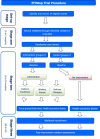Pilot trial of Stop Delirium! (PiTStop)--a complex intervention to prevent delirium in care homes for older people: study protocol for a cluster randomised controlled trial
- PMID: 24495514
- PMCID: PMC3923732
- DOI: 10.1186/1745-6215-15-47
Pilot trial of Stop Delirium! (PiTStop)--a complex intervention to prevent delirium in care homes for older people: study protocol for a cluster randomised controlled trial
Abstract
Background: Delirium (or acute confusion) is a serious illness common in older people, in which a person's thinking and perceptions may be affected. Reducing delirium is important because of the considerable distress it causes, and the poor outcomes associated with it, such as increased admissions to hospital, falls, mortality and costs to the National Health Service (NHS). Preventing delirium is possible using multicomponent interventions; successful interventions in hospitals have reduced it by one-third. However, there is little research to guide practice in care homes, where it is common because of the clustering of known risk factors (older age, frailty, and dementia). In previous work we developed a multicomponent intervention to prevent delirium in care homes, called Stop Delirium! The intervention was based upon evidence from the research literature relating to the prevention of delirium and on strategies to change professional practice. Before starting a large costly trial of Stop Delirium!, this pilot study will test and help improve the design and feasibility of the trial protocol.
Methods/design: We plan to conduct a cluster randomised pilot trial in 14 care homes (independent residential and nursing). Following recruitment of residents (over 60 years, consenting or with consultee agreement, able to communicate in English, and not in palliative care) participating homes will be randomised, stratified by size of home and proportion of residents with dementia. Stop Delirium! will be delivered to intervention homes over 16 months, with controls receiving usual care. The primary outcome measure will be the presence of delirium on any day during a one-month post-intervention period.We will collect data to determine 1) recruitment and attrition rates, 2) feasibility of various outcomes measurements, and 3) feasibility of capturing health resource use (resident diaries and by examining health records). We will estimate the between-cluster variation for the primary outcome, delirium occurrence.
Discussion: This pilot study will refine methods for the definitive trial. The lessons learnt will also contribute to implementing National Institute for Health and Clinical Excellence (NICE) delirium guidelines, which recommend multicomponent interventions for delirium prevention.
Trial registration: ISRCTN27972532.
Figures
References
-
- Young J, Inouye SK. Delirium in older people. Br Med J. 2007;334:842–846. doi: 10.1136/bmj.39169.706574.AD. - DOI - PMC - PubMed
-
- Wittenberg R. Demand for long-term care for older people in England to 2031. National Statistics Quarterly. 2001;12:5–16.
Publication types
MeSH terms
Associated data
Grants and funding
LinkOut - more resources
Full Text Sources
Other Literature Sources
Medical



